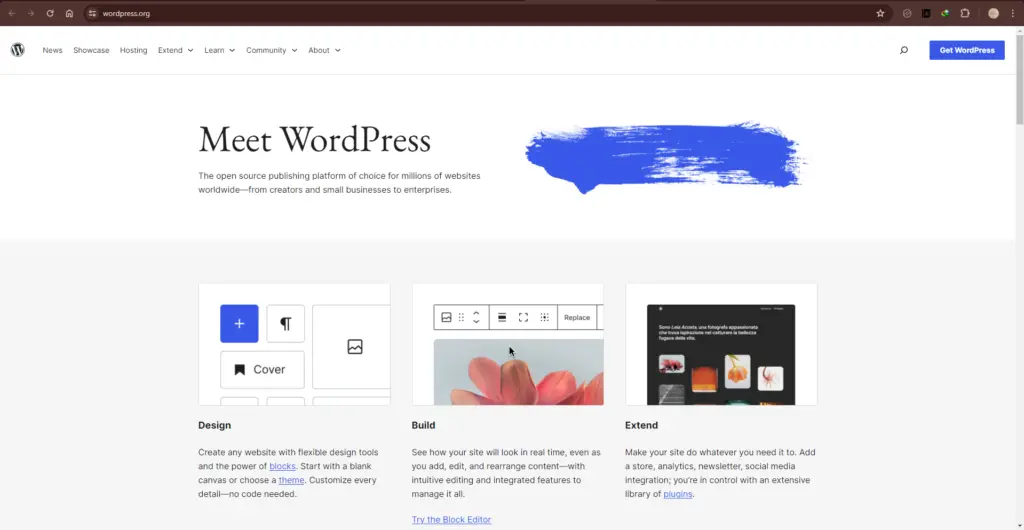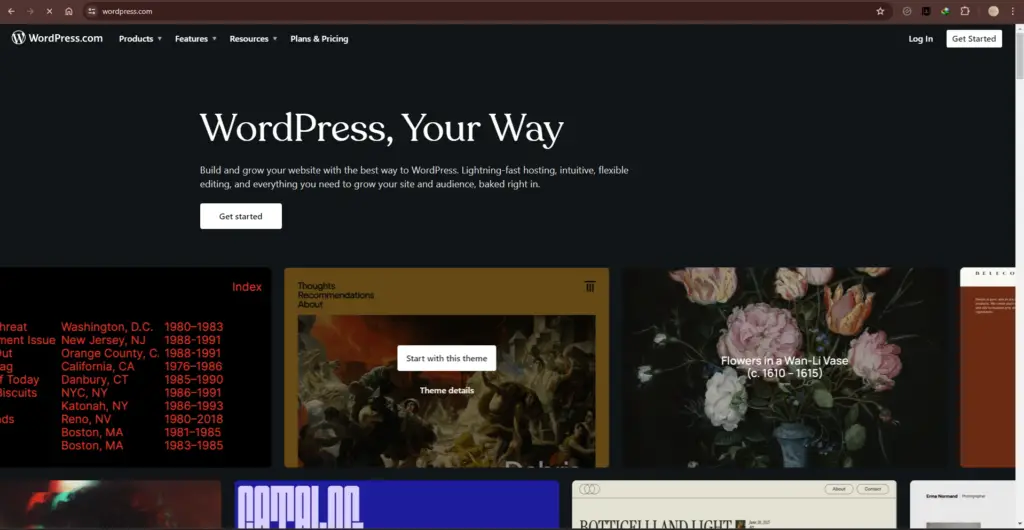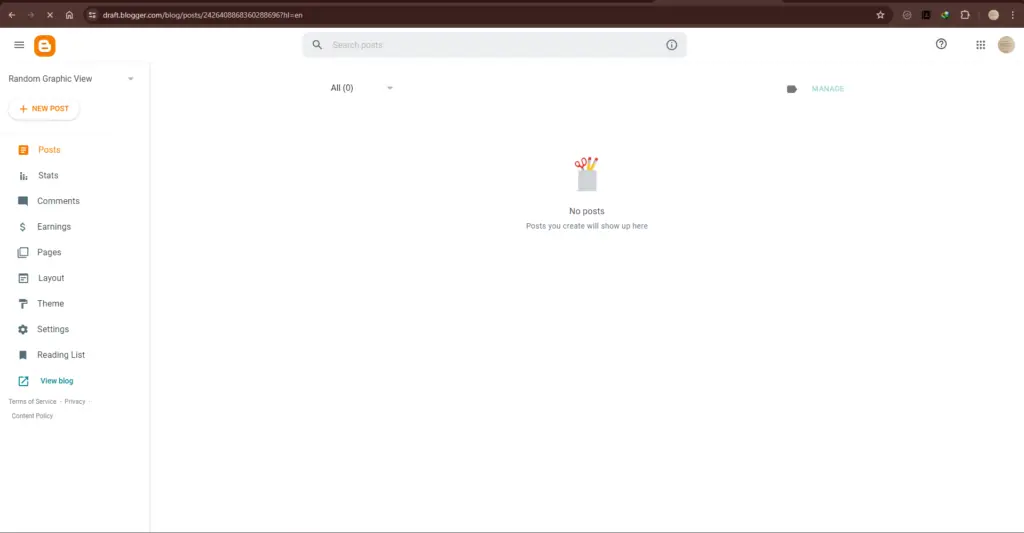
Table of Contents
Blogging is still going strong. Recent events on Twitter—or wherever—have highlighted the risks of relying solely on social media platforms to reach your audience. If you want to share your thoughts freely and stay in control, nothing beats having your own blog. And don’t forget, you can always share your blog posts on social media too.
If you have a business and want to share helpful info and tips with your customers, adding a blog to your website is usually the way to go. The great thing is, Google indexes your blog content, unlike most social media posts. This means you can attract potential customers to your business through content marketing, without having to spend money on ads. Take this blog you’re reading, for example: “Random26blogs” blog posts get millions of views every month and well this isn’t true yet but it will be soon but it get in thousands of views every month.
After trying out all the top blog sites, I’ve narrowed it down to the five best options. And yes, two of them happen to be WordPress, but we’ve also included some excellent alternatives to WordPress.
Top 5 Blogging Platforms
Here are the top 5 blog sites:
- WordPress.org: Gives you complete control.
- WordPress.com: Perfect for quick setup.
- Ghost: An alternative to WordPress.
- Wix: Makes building more than just a blog easy.
- Blogger: Lets you use your own domain for free.
What qualities define the top blogging platform?
Blogs have been around since the early days of the internet, so most people have a good idea of what they are, even if they haven’t really thought about it much. Here’s how I see it: a blog is a website, maybe with a few extra pages, but the main part is the list of blog posts in reverse order, with the newest ones at the top.
The software needed to create a blog is similar to the content management systems (CMS) used by big companies for their websites. Many tools like WordPress and Drupal can be used for both building a blog and running a regular website.
When I made this list, I looked for two main things to decide if a tool was good for blogging. First, it had to be quick and easy to set up a real blog. Second, the part where you write blog posts had to be easy to use and have all the features you need.
For example, Squarespace is a good website builder that can make a blog, but it’s not very easy to set up, and the part where you write blog posts isn’t very good.
Drupal is a powerful CMS, but it’s too hard for people who aren’t developers to use for blogging. I’ve tried it—it’s just not worth the trouble for most people. On the other hand, WordPress is both quick and easy for regular people to start a blog, and the part where you write blog posts is easy and nice to use.
So, on this list, you’ll only find tools that meet the basic requirements for blogging. But that’s not all. I also made sure that all the blogging tools:
- Are customizable. A big part of blogging is having your own unique site, not just another generic Instagram account. I looked for tools that let you pick your own theme and create your own branded blog. The easier it was to do this, the better.
- Have good support. While I wanted the tools to be easy to use, setting up a website often involves dealing with technical stuff. So, I made sure these tools either have a community of users who write tutorials and help each other out, or they have a dedicated customer support team. Which support option you rely on usually depends on how much you’re willing to pay each month.
- Are affordable. This isn’t a list of the cheapest blogging platforms, but I made sure affordability and getting good value for your money were important. There are free blogging platforms you can use to start a blog, but if you expect a lot of traffic or want premium support, you might have to pay for it.
To find the best blog sites, I started with a list of about 25 possible platforms, most of which I had already tried, reviewed, or used during my career. I quickly eliminated some good content management systems (CMSes), website builders, and newsletter services because they were too difficult to set up or didn’t focus enough on blogging. A few other options were too small to recommend or seemed to be no longer available.
That left me with about 10 options to test thoroughly, and from those, I picked the five best. I wish I could say there were some hidden gems among them, but when it comes to something as important as running a secure, fully-featured blog on the internet, it’s best to choose one of the well-known platforms.
Best Total Control Blogging Platform

WordPress.org
WordPress.org: Pros and Cons
Pros:
- Highly customizable and expandable
- Widely used, making it easy to find guides and developers
Cons:
- Often requires some tinkering to get everything just right
WordPress.org powers over 40% of all websites, from small local sites to major publications. It’s the most popular platform for blogging and managing content, and since it’s open source, it’s free to use on your own server (apart from hosting costs).
If you want full control over your blog—how it looks and what you publish—WordPress.org is the way to go. While you can host it yourself, using a hosting service like Bluehost or Kinsta is simpler—they can set up WordPress for you automatically.
WordPress offers tons of customization options with thousands of themes and plugins available. Whether you’re a photographer, designer, or want to sell products through your blog, there’s a theme or plugin for you. The WordPress community provides excellent support to help you navigate this vast ecosystem.
However, running your own WordPress site means you’re responsible for maintenance and troubleshooting unless you opt for managed hosting or hire a developer. While basic tasks are easy, customizing themes or adding complex functionality might require some research. Depending on your experience, WordPress can be a breeze or a bit challenging.
Despite its learning curve, WordPress’s benefits outweigh its drawbacks. Its integration with Zapier allows for automating tasks like sharing new posts on social media.
I use WordPress.org for my dog product review site, Bing’s Best Things, and plan to use it for future projects.
Price: Free for WordPress itself; hosting costs range from a few dollars to thousands per month; additional plugins and themes vary from free to premium options.
To get start Quickly This Is The Best Blogging Platform

WordPress.com
WordPress.com: Pros and Cons
Pros:
- Offers the WordPress experience with less hassle
- Quick and easy way to launch a good blog
Cons:
- More expensive and less customizable than hosting your own WordPress site
WordPress.com is a version of WordPress that’s hosted by the developers themselves. It’s really easy to set up. While there are free accounts, you need to pay for more customization options similar to what you get with the self-hosted version.
Starting is simple: go to WordPress.com, sign up for a free account, answer a few questions, and within minutes, you have a free blog with a .wordpress.com domain name (like harryszapiertestblog.wordpress.com). The default theme and sample posts depend on your answers. It’s convenient, but there are some limitations: there are around 100 themes available, some of which you have to pay for, there are ads for WordPress.com on your site, and you can’t contact support.
If you’ve used the self-hosted WordPress before, you’ll find WordPress.com familiar. The backend is similar but with fewer customization options. It still uses the Gutenberg editor: Go to Posts > Add New, write your blog, click Publish, and it’s live. You can also add other pages like an about or contact page. Spend some time on it, and you’ll have a full blog—though it may look more basic than a self-hosted one.
To do more than just the basics with a .wordpress.com domain, you need to upgrade to a paid plan. The $9/month Personal plan lets you use your own domain, removes ads, and offers email support. You still have limited themes unless you get the $18/month Premium plan, which gives you more themes and customization. It’s not until you get the $40/month Business plan or $70/month eCommerce plan that you can use third-party themes and plugins like with your own WordPress server.
If you want the WordPress experience without the trouble of self-hosting, WordPress.com is a good choice. It’s quick to start a simple blog for free.
Price: Free plan available; Premium plans start at $9/month.
For Most People This Is The Best WordPress Alternative

Ghost
Ghost: Pros and Cons
Pros:
- A strong alternative to WordPress, especially for blogging and growing an audience
- Offers features like memberships and newsletter subscriptions built in
Cons:
- Less customizable compared to WordPress
WordPress has been around since the early 2000s and has evolved over time, gaining new features. However, some find it bloated and using outdated technologies. John O’Nolan, a former WordPress developer, created Ghost about a decade ago as an alternative.
Ghost is designed to be a powerful and user-friendly platform for blogging and managing audiences, especially for subscription-based publications. It’s more focused on blogging and publishing content like newsletters compared to WordPress.
Ghost follows a similar business model to WordPress. It’s free and open-source, meaning anyone can download and run it on their own server for free. However, setting it up is a bit more challenging than WordPress due to fewer pre-configured options. Alternatively, there’s Ghost Pro, a hosted version starting at $11/month. Revenue from Ghost Pro goes back into developing the open-source software.
While Ghost started as a blogging platform, it has expanded to include paid newsletter and community features in recent years. It competes with platforms like Patreon and Substack. Even if you don’t use these features, Ghost offers a simpler experience compared to WordPress. However, it’s less customizable, although it includes features like SEO management and memberships as standard. Ghost integrates with Zapier, allowing for automation tasks like sharing blog posts to Buffer or importing Google Docs drafts.
If you prefer a more focused platform, Ghost is a good alternative to WordPress. While it may lack the same level of customization, it offers a simpler experience overall.
Its More Than A blog, Best Blogging Tool

Wix
Wix: Pros and Cons
Pros:
- Makes building a great website, including a blog, easy
- Easier to use compared to WordPress
Cons:
- More expensive than other options
Most website builders don’t offer a good experience for blogging. They either hide blog tools or are difficult to use. Wix stands out because it’s not only simple to create a website with it, but setting up and posting to a blog is just as easy.
When you start with Wix, you describe what you want to build. If you mention a “blog,” it adds one for you. In the Dashboard, there’s a section for your blog where you can write posts, set up categories, and do other blog-related tasks. It’s straightforward, and you can even import posts from WordPress.
Wix is great for two types of people: those who want an easier alternative to WordPress and those who want to build a full website where a blog is just one part.
While WordPress can be tricky to set up if you’re not tech-savvy, Wix’s website builder is easier to use. However, Wix is more expensive. You can get a WordPress blog with a custom domain for a few dollars a month, but for similar features, Wix’s Light plan starts at $16/month. For businesses, this might not be a big deal, but for personal blogs, it can add up.
Additionally, while millions use WordPress for full websites, Wix simplifies the process. Whether you want an online store, web bookings, or just a large website, Wix’s user-friendly tools can offer a smoother experience, especially if you’re considering managed WordPress hosting. Wix integrates with Zapier, allowing you to connect it with other apps you use.
Price: Free plan available; paid plans start at $16/month.
Use This Best Blogging Site For Free Custom Domain

Blogger
Blogger Pros and Cons
pros:
- Lets you use your own domain for free
- That’s it
cons:
- Really, it’s not great
Blogger isn’t a standout blogging platform in terms of features. Even after an update in 2020, the interface is pretty stripped back, the built-in themes aren’t stellar, and you can’t customize things like the post structure. The post editor, for example, mimics an even uglier version of Google Docs—which just doesn’t make for a great blogging experience. I’m shocked Google hasn’t killed it yet.
Really, it’s impossible to recommend, except that Blogger has one key feature that keeps it on this list: you can use a domain you already own, for free. With WordPress.com, on the other hand, unless you pay $4/month, you’re stuck with a blogname.wordpress.com URL.
Sign in to Blogger with your Google account, and create your first blog by clicking New Blog. Give it a name, and pick a theme. Then, click Settings in the sidebar, and under Publishing, select Custom Domain to add your custom domain name. Unfortunately, you can’t buy one through Google anymore, so you’ll need to configure things yourself with your domain registrar.
If you have a domain already and want to use it with your blog without any additional costs, or you just need somewhere to park a domain name so that it stays live, then Blogger is the service for you. But if you’re looking for a more customizable blog that’s under more active development, go with one of the other options.
Blogger price: Free, including using your own custom domain.
Which Blogging Platform Should I Use?
WordPress, whether self-hosted or through WordPress.com, is popular for a reason: it’s versatile and can handle whatever you need for your blog. Ghost is more focused than WordPress but comes at a higher initial cost. If you’re starting a publication or newsletter, or simply prefer not to use WordPress, Ghost is a top choice. Wix, known as a great website builder, also serves as a decent blogging platform. If you want the convenience of an easy-to-use site builder, Wix is a solid option. While Blogger is outdated, it’s free and allows you to use your own domain name.
There are other blogging platforms out there that didn’t make our list. For instance, if you have developers on staff, a CMS like Joomla or Drupal, or even a headless CMS like Contentful, might be suitable. However, these options aren’t ideal for most people starting a blog.
Related Reading:







I read this paragraph completely regarding
the comparison of hottest and previous technologies, it’s amazing article.